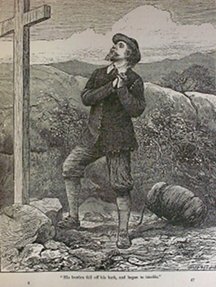Not too long ago, the news was abuzz about whether or not vice presidential candidate Sarah Palin believed that dinosaurs and humans lived as contemporaries about 4,000 years ago. One would wonder whether The ones ridiculing her believed at all in freedom of religion or free speech. Apparently, they believe that anyone that does not toe the line on evolutionary doctrine is totally disqualified for public service. That election may be over, but the issue remains.
Many of those who questioned Sarah Palin's beliefs have totally rejected the Bible's authority. Many of those in public life have also rejected that authority. The question which we must answer is not how many people have rejected the Bible's authority. The question is whether those of us who claim that the Bible is God's inspired Word will trust it when it speaks plainly. After all, to use an old saying, any lemming can follow the crowd over the cliff. Will we dare to stand firm against the tide of public opinion? Will we stand firm and boldly proclaim that God's Word is the foundation, not only of our faith, but also of our philosophy.
How does the Bible address this issue? Do the Bible's authors, inspired as they were by the Holy Spirit, believe in the historical nature of the creation account which is found in Genesis chapters one through eleven? Let us look at some examples.
In 1 Corinthians 15:21-26, Paul compares Jesus Christ to Adam. Paul had a personal acquaintance with Jesus Christ, having met Him on the Damascus road. His argument assumes a literal existence of the first Adam. If he believed in an evolutionary timescale as many today believe, he could not have made the argument that death is a result of Adam's sin. If he believed that life had existed for thousands or millions of years before Adam with corresponding death, he could not have argued that death is an enemy that shall be destroyed. No, death is not a natural part of life. Death is an enemy that shall be destroyed. The penalty (death) brought in by Adam's sin has been paid by Jesus Christ. Because of Jesus, death will be destroyed.
In John chapter one we are told that Jesus Christ is the creative Word of God made flesh. Therefore, He is the eyewitness to the creative events. In Mark 10:2-12, Jesus is confronted by the Pharisees concerning marriage. They wanted to test Him about the lawfulness of divorce. Jesus did not take their bait, telling them that Moses allowed divorce due to their hardness of heart, but it was not as God intended it. Jesus referred to the creation of Adam and Eve at the beginning of the creation as being the foundation of marriage. Because God's plan was for a one-flesh union which man should not separate. Jesus accepted the creation of Adam and Eve at the beginning of creation as a literal historical event. Contrast this with the activist groups who are now trying to redefine marriage to allow for homosexual, lesbian, or other forms of unions to be called marriage as well. If Jesus' statement of the creation of male and female in the beginning were not true, then there would no longer be justification for maintaining the definition of marriage as between one man and one woman.
Although Matthew's genealogy of Jesus only goes back to Abraham, Luke 3:23-38 presents a genealogy that traces the lineage of Jesus all the way back through Abraham and Noah to Adam. Luke also accepted that he was giving an authoritative, historical genealogy. Since the Bible tells us that, "All Scripture is given by inspiration of God," (2 Timothy 3:16), the account given in Luke is also God-breathed and therefore is to be trusted. If we claim to be Jesus' followers, then we should also be willing to believe this same history.
If we claim to be Bible-based believers, then we must stop disregarding the Word of God which provides the basis for our beliefs. We have an authority (Jesus) who was witness to the events of creation and who has inspired writers to record an accurate account of those events. We must be willing to base our worldview on that account. Man in rebellion has rejected that account and has created his own mythology (the big bang and molecules-to-man evolution) to explain the world without God. We must not follow the crowd in their rebellion, but must rather acknowledge that God's revelation should serve as, "...a lamp to my feet And a light to my path." (Psalm 119:105)
Sunday, April 24, 2011
Subscribe to:
Posts (Atom)
